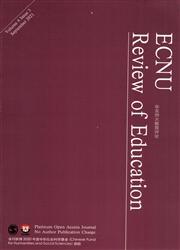“长大后务农”:韩国人文教育与批判文化教育的遗产
IF 2.6
Q1 EDUCATION & EDUCATIONAL RESEARCH
引用次数: 0
摘要
本文探讨了教师兼活动家李五德(Yi O-Deok)的文学作品,作为一个视角,探讨韩国教育中历史和文化上根深蒂固的人性化概念。本研究以“亚洲作为方法”的精神为基础,提供了一个独特的视角,说明了亚洲当地社会文化背景在丰富我们对普遍概念的理解方面的重要性。设计/方法/方法本研究采用方法论的方法,以李欧德的作品及其对批判性素养教育的影响为中心。主要的资料来源包括易的五卷本日记和他从20世纪50年代到80年代编辑的各种文学作品。李五德的人性化教育哲学深受当地环境的影响,提供了一个独特的、非西方的视角。它为西方中心的教育范式提供了一个重要的对照,丰富了对教育人性化的更广泛的理解。独创性/价值本研究的独特之处在于其对儿童作品的关注,肯定了对原始“土壤语言”中包含的纯粹精神的未经过滤的表达的信仰,这些表达在韩国近代史的社会政治动荡中一直坚持下来。这反过来又加强了对教育中“人性化”概念进行细致入微的非西方解释的呼吁。本文章由计算机程序翻译,如有差异,请以英文原文为准。
“We’ll Be Farmers When We Grow Up”: Education for Humanization and the Legacy of Critical Literacy Education in Korea
Purpose This article explores the literary work of a teacher and activist, Yi O-Deok, as a lens to approach historically and culturally embedded notions of humanization in education in Korea. Anchored in the ethos of “Asia as Method,” this study offers a unique perspective that exemplifies the importance of the local sociocultural context in Asia in enriching our understanding of universal concepts. Design/Approach/Methods This study adopts a methodological approach centered around the examination of Yi O-Deok's work and his influence on critical literacy education. Key source materials include Yi's extensive five-volume diary and the various literary pieces he edited from the 1950s to the 1980s. Findings Yi O-Deok's philosophy on humanizing education, deeply influenced by local contexts, provides a distinct, non-Western perspective. It offers a critical counterpoint to Western-centric educational paradigms and enriches the broader understanding of humanization in education. Originality/Value The uniqueness of this study resides in its focus on children's writings, affirming faith in the unfiltered expressions of their pure spirits encapsulated in the raw “languages of the soil,” which have persevered through the sociopolitical upheavals of Korea's modern history. This in turn strengthens the call for a nuanced, non-Western interpretation of the concept of “humanization” in education.
求助全文
通过发布文献求助,成功后即可免费获取论文全文。
去求助
来源期刊

ECNU Review of Education
Social Sciences-Education
CiteScore
4.90
自引率
0.00%
发文量
41
审稿时长
10 weeks
 求助内容:
求助内容: 应助结果提醒方式:
应助结果提醒方式:


